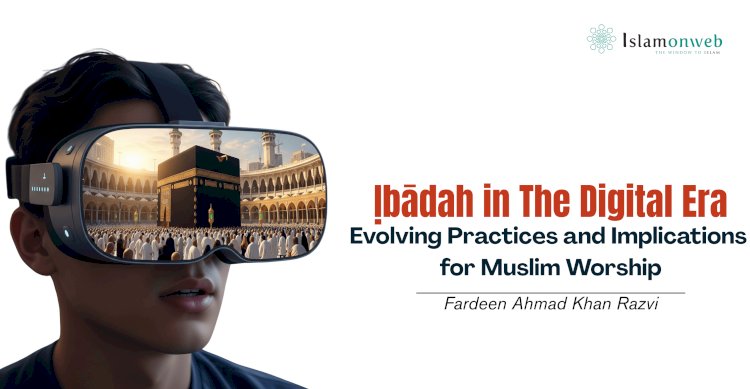Ịbādah in The Digital Era: Evolving Practices and Implications for Muslim Worship
Allah’s name I commence with, the Most Affectionate, the Merciful
The Islamic concept of Ịbādah is a holistic one. It encompasses all aspects of living life in accordance with the sacred rules of the Sharī’ạh; every good act undertaken by a Muslim is regarded as worship as long as he or she has performed it with righteous intentions. [1] Daily acts of Ịbādah constitute the cornerstone of a Muslim’s routine. Observance of the five daily prayers at prescribed times, reading or listening to the Qur’ān, studying religious texts, and engaging with scholarly discourses are essential practices for a devout Muslim. Even supplicating to the Almighty Allah is an act of worship as the Prophet Muhammad (peace be upon him) explained: “Supplication (Duạ̄) is itself worship (Ịbādah)”. [2]
In the modern age, where distractions are rampant and there is an acute paucity of attention span, it has become hard to retain focus on the most important aspects of life. What’s more is that there are many forces, whatever may be their nature, that have been deployed to ensnare human beings into vortexes of gluttony and addiction. Social media applications utilise algorithms that track user interactions - every touch, scroll and swipe of a person - and then deliver personalised content feeds designed to maintain continuous engagement. In a never-ending cycle of dopamine peaks followed by devastating crashes, it becomes increasingly complex for today’s Muslims to safeguard their mental resources. However, these challenges do not stop Ịbādah and religious adaptability from undergoing continual evolution.
The digital age has become fully integrated into all facets of daily life, leading to significant transformations in religious practices. This phenomenon, referred to as the ‘digital transformation of Ịbādah,’ reshapes traditional worship patterns while maintaining the spiritual essence of observance. Technological applications in Islamic worship, from mobile prayer apps to VR mosques and online Ziyārah, reflect the intersection of tradition with innovation in Muslim communities worldwide. The methods of religious engagement have undergone significant transformation in the past twenty years, as Muslim scholars and academics recognised the importance of disseminating information in online multi-media formats (images, videos and audios) as early as the 1990s. Technologies have become pervasive in daily life, particularly in religious practices, sparking extensive community debate. This unprecedented era offers both opportunities and challenges for spiritual engagement.
Ever since the COVID-19 pandemic, the world has never been the same, and so has the mode of engagement with their Deen for many Muslims around the world. During a time of physical distancing and closure of mosques, the community swiftly adapted to technological solutions to maintain their daily practices and spiritual connection to Islam. [3] [4] What was seen at the time as an emergency measure has now perhaps evolved into something more permanent, an all-new facet of technological applications for the purpose of Ịbādah. Recent studies have identified many key themes in the nature and process of digitalization of Islamic practices, as Sukarman et al. (2016) noted that "Ịbādah activities and Muạ̄melah activities have been affected by advances in information technology so that they experience a shift in religious patterns from manual to online-based". [5] Though the content, fundamentals and undying truths remain the same, the way of approaching the religion has changed for many Muslims, where convenient and quick retrieval of Islamic facts is at the forefront of this change.
The most visible aspect of religious digitalization may well be the proliferation of Islamic mobile applications in our society, apps such as Prayer Times by Dawat-e-Islami and Muslim Pro have millions of downloads globally and provide many services such as accurate prayer times, Qibla direction, Qur’an reading, Quranic recitation etc. [6] In a very short time, these apps have achieved widespread adoption and are utilized regularly, addressing the needs particularly in non-Muslim majority contexts where physical Islamic infrastructure may be limited. Not only this, these applications are also providing a robust platform to build digital religious communities, providing religious educational content, and even facilitating the preservation of religious identity in diverse cultural contexts. [7]
Another prospect of transforming Ibadah could be the ongoing development of AI-based chatbots for answering queries about diverse Islamic topics from jurisprudence (Fiqh) to Prophetic narrations (Ḥadītḥ). These chatbots are meant to provide instant access to religious information for students and learners of all ages. [8] Creating chatbots that could converse with children and answer their questions about their Deen in a clear and lucid way could fundamentally transform the way we teach our young ones. However, there are many Islamic legal and ethical concerns regarding the development of such systems. Islamic scholarship is historically grounded in authenticity, human interpretation, contextual understanding and the unbroken chain of transmission from the time of Prophet Muhammad (peace be upon him) till today. These are elements that cannot be authentically reproduced by AI, and to artificially simulate them to an acceptable extent is out of the scope of current AI systems so far. [9] [10]
Virtual Reality-based exploration of Islamic religious and heritage sites received increased attention with the introduction of MetaMosque, a VR-based application that lets its users visit mosques around the world remotely. [11] It is a place that lets even the most economically challenged experience the beauty and wonder of Māsajid around the globe. The app allows users to virtually visit the Al-Ḥaram mosque in Mecca and the Al-Aqṣā mosque in Palestine. Although Islamic scholarship has a consensus on the fact that virtual visitation or pilgrimage will never be a substitute for the physical one, [12] it is essential to note that with the right intentions, even looking at the pictures of these Māsajid and appreciating their religious value is an act of worship.
While digital transformation and digitalisation provide many benefits, they entail notable disadvantages. Privacy in the digital world is a major concern for people and policymakers around the world. There are legitimate and significant privacy-related concerns of Muslims about the collection, storage, processing and possible sharing of their sensitive religious data. Research has revealed that 96% of Muslim-focused applications request access to device identification and call information, while 40% request location data [13]. This might not be an immediate concern for some; However, there are still potential risks for surveillance and religious profiling. Even if the applications do not dissipate the data to other parties, potential vulnerabilities persist malicious actors may exploit them. Such data could be sold to all sorts of groups which can use it to target the Muslim population and possibly even cause harm.
To conclude, technology possesses the capacity to enhance Ịbādah if developed and implemented with traditional Islamic principles and community needs in mind, along with robust security and privacy measures. This requires a balanced approach that aims to enhance (the experience of) rather than replace spiritual Islamic practices. Furthermore, the enduring effort of maintaining authentic Islamic identity in a diverse global landscape must remain central to all technological innovations and integrations in Muslim contexts. With the ever-growing world, Muslims ought to exercise continual oversight and active participation in technological development and policymaking, so as to ensure a future which is inhabitable, inclusive and amicable to the Muslim population. The poet of the East Shāyar-e-Mashriq Allama Dr. Iqbal captures this theme beautifully in his couplet:
Dee(N) hāth se dekar agar āzad ho millat
Hai aisi Tijārat me Musalmaa(N) ka Khasārā
About the author:
Fardeen Ahmad Khan Razvi - Asst. Professor, Dept of Engineering (CSE/IT), SRMS College Bareilly - is an author with over a hundred articles and over two dozen booklets to his credit in Arabic, English, Urdu and Hindi languages. He is a columnist for leading Urdu newspapers from Srinagar to Hyderabad, with his articles featured in over 90 op-eds nationally. The author has received critical acclaim from many traditional scholars, including one of the 500 most influential Muslims Allama Qamaruzzaman Khan Azami, for his poetry and prose. He is an eloquent Urdu poet whose works have been published in books, magazines and periodicals in India and abroad.
References
|
[1] |
Nawawi., “40 Hadith Nawawi. (n.d.). Hadith 1 – Actions are by intentions.,” [Online]. Available: https://40hadithnawawi.com/hadith/1-actions-are-by-intentions/. |
|
[2] |
Tirmidhi, Sunan al-Tirmidhī,Sunan al-Tirmidhī, hadith no. 3247, graded Sahih, Available: https://sunnah.com/tirmidhi/48/17. |
|
[3] |
PMC, “Islam and the COVID-19 pandemic: Between religious practice and health protection,” 2021, July 15. |
|
[4] |
Fulcrum, “Digital Islam in Indonesia: The shift of ritual and religiosity during COVID-19.,” 2021, August 19. |
|
[5] |
F. S. R. Sukarman, “Mediatization of Islam in the Digital Era: Opportunity or Threat?,” Universitas Islam Nahdlatul Ulama Jepara. |
|
[6] |
Dawat-e-Islami, “Prayer times, Azan & Qibla direction app.,” 2019. [Online]. Available: https://www.dawateislami.net/downloads/islamic-apps/prayer-times-&-qibla. |
|
[7] |
A. Busfield, “Covid-19 building a bridge between religion, technology,” Feb 18, 2021. [Online]. Available: https://asiatimes.com/2021/02/covid-19-building-a-bridge-between-religion-technology/#. |
|
[8] |
A. Hakim, “Artificial Intelligence in Teaching Islamic Studies,” MOLANG: Journal Islamic Education, 2023. |
|
[9] |
A.-J. i. Yusuf, “AI and the Future of Islamic Scholarship: Preserving Tradition in a Digital Age,” Buy me a Coffee, [Online]. Available: https://buymeacoffee.com/omar1800m/ai-future-islamic-scholarship-preserving-tradition-digital-age. |
|
[10] |
S. A. .. Malik, “Artificial Intelligence and Islamic Thought: Two Distinctive Challenges,” Journal of Islamic and Muslim Studies, 2024. |
|
[11] |
“MetaMosque to enable virtual exploration of mosques around the world,” Gulf Times, June 27, 2023. |
|
[12] |
“Acts of Worship in the Digital Age,” Egypt's Dar Al-Ifta, 2024. [Online]. Available: https://www.dar-alifta.org/en/fatwa/details/20709/acts-of-worship-in-the-digital-age. |
|
[13] |
P. Bischoff, “Pray in privacy: apps for Muslims that respect your personal data,” https://www.comparitech.com/blog/vpn-privacy/muslim-prayer-app-study/, 2023. |
Disclaimer
The views expressed in this article are the author’s own and do not necessarily mirror Islamonweb’s editorial stance.
























Leave A Comment